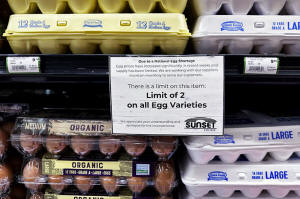Egg prices continue to hit records as Easter and Passover approach, but
some relief may be coming
[March 13, 2025] By
MAE ANDERSON
NEW YORK (AP) — Egg prices again reached a record high in February, as
the bird flu continues to run rampant and Easter and Passover approach.
The latest monthly Consumer Price Index showed a dozen Grade A eggs cost
an average of $5.90 in U.S. cities in February, up 10.4% from a year
ago. That eclipsed January's record-high price of $4.95.
Avian flu has forced farmers to slaughter more than 166 million birds,
mostly egg-laying chickens. Just since the start of the year, more than
30 million egg layers have been killed.
If prices remain high, it will be third year in a row consumers have
faced sticker shock ahead of Easter on April 20 and Passover, which
starts on the evening of April 12, both occasions in which eggs play
prominent roles.
The price had consistently been below $2 a dozen for decades before the
disease struck. The U.S. Department of Agriculture expects egg prices to
rise 41% this year over last year’s average of $3.17 per dozen.
But there may be light at the end of the tunnel. The USDA reported last
week that egg shortages are easing and wholesale prices are dropping,
which might provide relief on the retail side before this year’s late
Easter, which is three weeks later than last year. It said there had
been no major bird flu outbreak for two weeks.
“Shoppers have begun to see shell egg offerings in the dairycase
becoming more reliable although retail price levels have yet to adjust
and remain off-putting to many,” the USDA wrote in the March 7 report.

David Anderson, a professor and extension economist for livestock and
food marketing at Texas A&M University, said wholesale figures dropping
is a good sign that prices could go down as shoppers react to the high
prices by buying fewer eggs.
“What that should tell us is things are easing a little bit in terms of
prices,” he said. “So going forward, the next CPI report may very well
indicate falling egg prices.”
[to top of second column] |

A sign is mounted on a shelve of eggs at a grocery store in
Northbrook, Ill., Feb. 28, 2025. (AP Photo/Nam Y. Huh, file)
 However, he doesn't expect lasting
changes until bird stock can be replenished and production can be
replaced.
“Record high prices is a market signal to producers to produce more,
but it takes time to be able to produce more, and we just haven’t
had enough time for that to happen yet,” he said. “But I do think
it’s going to happen. But it’s going to take some more months to get
there.”
Emily Metz, president and CEO of the American Egg Board, said
wholesale prices dropping is good news, but noted that increased
demand for Easter could drive a temporary increase in prices.
“In addition, egg farmers are closely watching spring migration of
wild birds, recognizing that wild birds are a leading cause of the
spread of this virus and pose a great and ongoing threat to
egg-laying flocks,” she said.
Advocacy groups and others have also called for a probe into whether
egg producers have used the avian flu to price gouge. But egg
producers say the avian flu is solely behind the elevated prices.
Meanwhile, restaurants have added surcharges and made other changes
to offset the cost of eggs.
The Trump administration has unveiled a plan to combat bird flu,
including a $500 million investment to help farmers bolster
biosecurity measures, $400 million in additional aid for farmers
whose flocks have been impacted by avian flu, and $100 million to
research and potentially develop vaccines and therapeutics for U.S.
chicken flocks, among other measures. But it will likely take a
while for that plan to make an impact.
All contents © copyright 2025 Associated Press. All rights reserved |